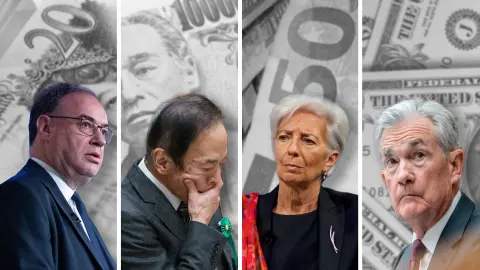How China is dodging the doom loop
While China’s economy is still struggling, it is at least not getting incrementally worse and there are some pockets of improvement
It looks like the economy is forming a trough in some areas
The last month has delivered a lot of data. And while there is a lot more to say about the condition of the economy, the principal fact seems to be that conditions are not getting incrementally worse. That is important. China is not currently spiralling into a doom-loop. Growth is returning, slowly, and not uniformly. But where there is growth, there is hope.
Let’s deal with the positives first, because there are still plenty of negatives: New CNY loans picked up in September, and aggregate financing volumes were also higher. Further lending will be helped by the 25bp reduction in banks’ reserve requirements.
PBoC holding the line on the CNY
We did not, however, see any further reductions in any of the policy interest rates, mainly due to the People's Bank of China's ongoing struggle to keep USD/CNY from depreciating above 7.30. And while the USD remains strong, conventional rate cuts seem to be off the agenda. The PBoC seems to be playing a holding game, waiting and hoping for some turn in the USD. And while it waits, it uses its daily reference point fixing to keep pushing the CNY lower (stronger) and allowing short-term funding rates to rise to make it more expensive to borrow in CNY and sell to buy foreign exchange. For the time being, the policy seems to be working. Occasional verbal warnings to the banks not to sell CNY also help.
China Exports (CNY, seasonally adjusted)

Year-on-year export declines shrinking
Exports continue to decline in year-on-year terms, but the rates of decline are decreasing. Looked at in CNY terms, and adjusted for seasonality, exports, like some other parts of the economy, seem to be troughing.
This troughing can be seen in plenty of other data too. The monthly data deluge showed manufacturing and industrial production figures edging up slightly in year-on-year terms. Not by very much, but the direction is the important thing right now. Recent PMI data has also edged out of the contraction zone, though for the non-manufacturing sector, buoyant expectations are doing a lot of the heavy lifting, and it remains to be seen whether there is more to this than wishful thinking. The same can be said of retail sales, which have recovered slightly after undershooting their historical trend on the downside in recent months. As for the inflation rate, we challenged the “deflation” label provided a couple of months ago as being inaccurate, as well as likely temporary. Inflation has indeed edged back above the zero line, although only just. This is also mainly due to the expiry of base effects from falling food prices, though there is no getting around the fact that weak demand is the main reason why inflation is as low as it is in the first place.
China PMI headlines (>50 = expansion)

Government sticking to its supply-side approach
What hasn’t changed particularly is the government’s approach to the economy. This is not to say that they are doing nothing. They are. But they still seem to favour targeted market support through multiple supply-side policies, rather than a single one-size-fits-all fiscal boost. We don’t think that will change. Dealing with the economy’s excessive leverage has been an ongoing goal and one that now seems to have been raised above other targets. You can question the timing of this, but this has been a longstanding weakness of the economy, and it feels like some short-term growth will have to be sacrificed to enable a brighter longer-term outlook.
The real estate sector of the economy continues to struggle. Renewed concerns over the fate of China Evergrande have surfaced following the detention of its chairman. And there are still questions looming over the economy’s largest developer, Country Garden, which faces $14.9bn in further maturing debt next year, amid plunging unit sales, even as it has so far managed to avoid any default.
While the real estate sector continues to flounder, this will keep dragging on manufacturing, and labour demand, and in turn, on job availability and wages. The authorities in China will be hoping that this year’s Golden Week Holiday, which is happening currently, encourages some more spending. But it seems optimistic to think that this will substantially offset weakness in other parts of the economy or dramatically change the overall trend.
This publication has been prepared by ING solely for information purposes irrespective of a particular user's means, financial situation or investment objectives. The information does not constitute investment recommendation, and nor is it investment, legal or tax advice or an offer or solicitation to purchase or sell any financial instrument. Read more
Download
Download article
5 October 2023
ING Monthly: An inconvenient truth for central banks This bundle contains 14 Articles